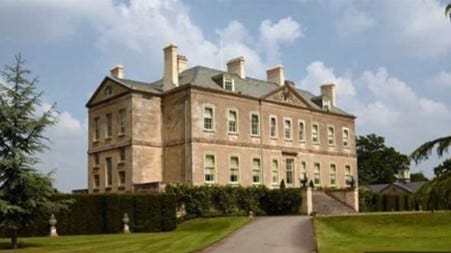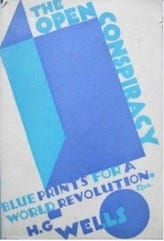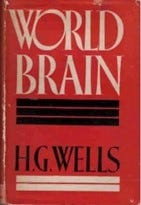The Fabian Society - A New Version in Two Parts - Part One
The Socialists Who Love Luxury for Themselves But Not for The Rest
My last post has been updated and published elsewhere in two parts. I think it’s better so here it is again.
A couple of weeks ago my wife and I had a lovely afternoon out. We have been members of the National Trust for over 40 years, and we’ve visited a good number of its properties many times over. I know, I know, it’s been taken over by the obnoxious wokerati but that generally doesn’t detract from the pleasure to be had from the great houses, their gardens, grounds, teas and scones. Although, I must confess, I do feel an urge to carry with me a thick, black permanent marker in case I come across any examples of woke signs or false information that require correction.
Anyway, our destination a fortnight ago on a sunny afternoon was Buscot Park between Faringdon in Oxfordshire and Lechlade-on -Thames which is just inside Gloucestershire and on the edge of the Cotswolds. The house is neoclassical and dates from 1780-83 when it was built for Edward Loveden. It stayed in the Loveden family until 1859 when it was bought by an Australian, Robert Tertius Campbell, and on his death in 1887 it was sold to the financier Alexander Henderson who first became a baronet then later a baron in 1916 as the first Baron Faringdon after serving as a Liberal MP (one of Lloyd George’s sold honours?). On his death in 1922 it passed to his grandson, Gavin Henderson, who became the second Baron Faringdon in 1922. The house and the estate were bequeathed to the National Trust in 1956 under an arrangement that allows the third baron and the rest of the Henderson family to continue to live there and manage the estate while the house, gardens and grounds are open to the public each summer. A satisfactory arrangement all round in lieu of the punitive inheritance taxation in force at the time, one thinks.
It is the second Baron Faringdon who is of interest. Educated at Eton and Christ Church, Oxford, he had an effeminate demeanour and a left-wing leaning. Probably in reaction to his army colonel father’s rigid conservative politics, he joined the Labour Party and sat on the Labour benches in the House of Lords. During the Spanish Civil war, he offered moral and material support to the anti-Franco Republican forces. His firm pacifist beliefs gained him exemption from military service in the Second World War and he served instead in the London and Bristol Fire Brigades.
Through the war he was an active member of the Fabian Society and he was on its committee from 1942 to 1966, on the colonial bureau 1952-58, and its vice-president from 1970 to 1977. He was a member of a parliamentary goodwill mission to USSR in Jan/Feb 1945, though he shocked the interpreters by his forthright remarks on Churchill's policy in Greece foreseeing that it would end in civil war. From 1940 to 1945 he was the Treasurer of the National Council for Civil Liberties, and in 1950s involved with the Bevinite Keep Left Group. He was a member of the parliamentary Labour Party executive from 1957 to 1960 and Buscot was regularly used as a venue for conferences. In fact, Fabian Society meetings were held regularly at Buscot. Members of the post-war Atlee Labour government and the later Wilson/Callaghan Labour administrations would have met, dined, slept, and strolled in the grounds discussing their plans for a socialist utopia in Britain. It was conveniently located for leftist academics from Oxford University too. The current Baron Faringdon remembers it well:
The house echoed loudest to the rhetoric of Nye Bevan and, later, to the economic theories of Balogh and Kaldor (Harold Wilson’s economic gurus). Every weekend the house was crammed with politicians, painters and friends - sometimes in improbable combinations. I remember vividly when he had members of the Fabian Society staying….
So, members of the Fabian Society loved country house weekends. Just who or what is the Fabian Society; who were its prominent members and who are members today?
The Fabian Society is a British socialist organisation which has the aim of advancing towards ‘democratic socialism’ gradually and by stealth rather than by sudden violent revolutionary overthrow. It was founded in January 1884 and named after Quintus Fabius Maximus Verrucosus, ‘Cunctator’, the Roman general whose successful campaign against the superior army of Hannibal the Carthaginian was won by accepting only small engagements on favourable ground which he knew he could win.
Soon after its foundation the first pamphlet of the society explained the tactics:
For the right moment you must wait, as Fabius did most patiently when warring against Hannibal, though many censured his delays; but when the time comes you must strike hard, as Fabius did, or your waiting will be in vain, and fruitless.
The logo chosen was a tortoise which symbolised the slow, steady progress towards its ultimate goal but the coat of arms, a wolf in sheep’s clothing, was perhaps nearer the truth. It was later dropped because of the negative impression it gave. It was possibly a bit too blatant.
The nine, or perhaps ten, founders of the society are quite obscure, but it didn’t take long for it to attract people who were already well known in public life in the Britain of the 1880s and 1890s. They were to play an important role in the Society. Prominent among them were H.G.Wells, George Bernard Shaw, Beatrice and Sidney Webb, Ramsey McDonald, Emmeline Pankhurst and, for a period, Bertrand Russell. At least two of them, as we shall see, held some unsavoury views about their fellow human beings.
The London School of Economics and Political Science was founded in 1895 by the Fabians Beatrice and Sidney Webb, Graham Wallas and George Bernard Shaw. It was funded by a bequest of £20,000 from Fabian member Henry Hunt Hutchinson to be ‘put to use in advancing the Society’s aims in any way the trustees deem advisable’. LSE held its first classes in October of that year, in rooms at 9 John Street, Adelphi, in the City of Westminster. It joined the University of London in 1900 and established its first degree courses under the auspices of the university in 1901 and was recognised as a Faculty of Economics of the university. LSE began awarding its degrees in its own name in 2008, prior to which it awarded degrees of the University of London. It became a university in its own right within the University of London in 2022.
It rapidly became a fierce rival to the University of Cambridge in all economic matters almost from the beginning, but they did manage to work together for a while in the 1920s. However, rivalry returned in the 1930s, personified by, on the one hand, Cambridge’s John Maynard Keynes who was a member of the infamous Bloomsbury Group, and on the other, LSE’s Friedrich Hayek, an advocate of Austrian economics who was a surprising champion for LSE to have, given its founders’ socialist leanings. He could perhaps be seen as an example of it being even-handed and living up to its Latin motto, Rerum Causas Cognoscere - to know the causes of things.
What is undeniable is that LSE was a success, and people came to it from all over the world to study economics and politics. It numbers among its alumni 55 past or present heads of state or government and 18 Nobel Laureates as well as people who were, or were to become, leading business magnates. Many well-known Americans attended LSE. Among them we find John F Kennedy in the 1930s, although he didn’t complete a degree, and Paul Volcker, who became Chairman of the Federal Reserve. At LSE at the same time as Kennedy was David Rockefeller.
From an LSE Blog:
David Rockefeller was an academically talented young man in his own right. Having initially graduated from Harvard in 1936 – where amongst other things he had written a senior dissertation dealing in part with the Webbs and the Fabians – he took another year up at “Cambridge Mass” in order to familiarise himself with economics. And it was economics that was to become his love. This in the end is what drew him to LSE, after having been initiated in the dark arts at Harvard by the brilliant and worldly-wise Austrian, Joseph Schumpeter. However, like most things to do with the Rockefeller’s (sic), nothing, it seems, was ever left to chance. Indeed, even before coming to the School David had taken advice from people at LSE about which courses to take at Harvard!
Not only was David Rockefeller intellectually interested in socialism from his undergraduate years, but the Rockefellers were already connected to LSE financially through grants to it of $2 million, a lot of money in those times, which helped the LSE enormously in the inter-war years. To some extent then, LSE can be seen as a Rockefeller baby. It is therefore unsurprising that in Dr Jacob Nordangård’s book, Rockefeller Controlling the Game, there are several references to the Fabian Society and its principle of gradualism which has also been read across to the UN/WEF policies on climate change, itself a Rockefeller baby.
But let us go back to one of the Fabian Society’s early members, H.G. Wells, a writer of more than fifty novels and dozens of short stories. If I had to pick three, I’d say his most famous works are probably The Time Machine, The Island of Doctor Moreau and The War of the Worlds. Very much a futurist, Wells was an early globalist who devoted much of his time to progressive ideas and imagining future utopias. Two works stand out in this context: The Open Conspiracy and World Brain.
The Open Conspiracy is, in Wells’ words, “a scheme to thrust forward and establish a human control over the destinies of life and liberate it from its present dangers, uncertainties and miseries."It proposes that largely as the result of scientific progress, a common vision of a world "politically, socially and economically unified" is emerging among educated and influential people, and that this can be the basis of "a world revolution aiming at universal peace, welfare and happy activity" that can result in the establishment of a "world commonwealth". This is to be achieved by "drawing together a proportion of all or nearly all the functional classes in contemporary communities in order to weave the beginnings of a world community out of their selection." This will ultimately "be a world religion."
The Open Conspiracy sold well and was well received by friends like Bertrand Russell, who said he read it "with the most complete sympathy." Some Open Conspiracy organisations were formed in a number of countries and a common newsletter was published. Wells discussed the ideas at luncheons with some leading British politicians, including Lloyd George, Harold Macmillan, and Harold Nicolson. The H. G. Wells Society set up by Gerald Heard in 1934 to promote Wells' ideas at one point changed its name to "The Open Conspiracy".
Both the book's form and content were not well received by his fellow Fabian, George Bernard Shaw, who thought that Wells dismissed Karl Marx too readily and wrote in the style of an editorialist. G. K. Chesterton was also critical:
There are two other difficulties I feel in this glorification of world government. One is the very simple fact that the real difficulty of representative government is how to make it represent, even in the smallest of small nationalities, even in the nearest parish council………The other objection is less simple and would need a more atmospheric description; but it is even more real. Mr. Wells is driven to perpetual disparagement of patriotism and militant memories, and yet his appeal is always to the historic pride of man. Now nearly all normal men have in fact received their civilization through their citizenship; and to lose their past would be to lose their link with mankind. An Englishman who is not English is not European; a Frenchman who is not fully French is not fully human. Nations have not always been seals or stoppers closing up the ancient wine of the world; they have been the vessels that received it. And, as with many ancient vessels, each of them is a work of art.
Wells' biographer Michael Sherborne notes that while Wells' critics have described The Open Conspiracy as anti-democratic and elitist, his supporters have argued the book is "a boost for a civil society realized today by bodies such as Greenpeace and Amnesty International."
World Brain is a collection of essays and addresses dating from the period of 1936–1938.
Throughout the book, Wells describes his vision of the World Brain: a new, free, synthetic, authoritative, permanent "World Encyclopaedia" that could help world citizens make the best use of universal information resources and make the best contribution to world peace. What Wells was foreseeing is the World Wide Web, or even just Wikipedia.
Wells again:
“This World Encyclopaedia would be the mental background of every intelligent man in the world. It would be alive and growing and changing continually under revision, extension and replacement from the original thinkers in the world everywhere. Every university and research institution should be feeding it. Every fresh mind should be brought into contact with its standing editorial organisation. And on the other hand, its contents would be the standard source of material for the instructional side of school and college work, for the verification of facts and the testing of statements—everywhere in the world. Even journalists would deign to use it; even newspaper proprietors might be made to respect it.”
But Wells also had a much darker side. Here we come to H.G. the Darwinist and eugenicist. After Darwinism had destroyed the conventional theology in the minds of most British intellectuals, the question in the mind of many of them was, ‘could Darwin provide an alternative basis for morality’? Wells, along with others felt that the solution lay in eugenics. For him and many other Darwinians of his time, it was vital for the salvation of the human race. Here he ‘out-Darwined’ Darwin, and he championed eugenics for most of his adult life. It is vividly shown in his book about his hope for the future of humankind, ‘Anticipations’. This was Wells’ first non-fiction best-seller. Its effect on British intellectuals and their European counterparts was profound. This book defended an ‘extreme program of negative eugenics. In his own words, Wells advocated favouring:
“The procreation of what is fine and efficient and beautiful in humanity—beautiful and strong bodies, clear and powerful minds … and to check the procreation of base and servile types … of all that is mean and ugly and bestial in the souls, bodies, or habits of men”
This was to be achieved by ‘death’ or ‘mercy killings’, and it was expected that those involved in the eugenic world that he promoted should have ‘no pity and less benevolence …’ and should ‘not be squeamish’ about inflicting death on the unfit, because those who kill the weak will have a ‘fuller sense of the possibilities of life than we possess. They will have an ideal that will make killing worth the while.’ His concern was to control the laws of evolution so that mankind could become their master rather than their victim. Included in Wells’ list of people earmarked for termination would be those with transmittable diseases, with mental disorders, with bodily deformations, the criminally insane, even the incurable alcoholic. All would be put to death humanely by first giving them opiates to spare them needless suffering.
Wells advocated not only killing, but also sterilization and birth control, as an effective way to rid the earth of ‘inferior’ races and peoples. Wells believed that evolution, operating on its own, was not ‘progressive’, but needed to be ‘directed’ by the educated elite. For this reason, he actively worked toward establishing eugenic programmes.
A question on many people’s minds then was the place of the Jews and what Wells called ‘the inferior races’ in society. Wells concluded that Jewish faces were ‘very ugly’ but added that so are many Gentile faces. Wells also concluded that many Jews are intensely vulgar in dress, materialistic and cunning, but added that so are many Gentiles. He believed that intermarriage would eventually cause the Jews to cease to exist as a physically distinct race.
Wells was far less charitable about the darker races. He even concluded that ‘those swarms of blacks, and brown, and dirty-white, and yellow people would have to go’.
This not only comes perilously close to Hitler’s efforts to breed a superior Aryan race, and to “solve the Jewish question” with the aid of gas chambers but it leads one to wonder if certain people sitting in Berlin had been taking note of what Wells wrote and said. Aktion T4 in Nazi Germany exemplified the first part of his eugenics plan perfectly.
As far as we know, Wells never retracted or even apologised for any of this. In his 1934 autobiography, he called Anticipations the keystone to the main arch of his life work, and he still advocated ridding the world of what he called the ‘unfit’, but no longer advocated killing them; instead, he wanted to rely on sterilisation, often called the ‘soft eugenicist approach’ as opposed to his earlier ‘hard eugenicist’ approach.
While Wells came to recognise that variety in human beings can have an advantage, many of his works also advocate a dictatorship by the educated-elite class and disparage the common, less-educated population. For this reason, he was opposed to democracy and felt that the world should be governed by an enlightened science-trained elite. For much of his life, he also actively advocated a world government. A scientific utopia, led by a powerful elite, which bears an uneasy relationship to the totalitarian horrors of Nazi Germany, the Soviet Union, communist China and, indeed, what the Davos crowd have in mind for the rest of us today.
In Part Two, A Nest of Shameless Eugenicists, we’ll meet Wells’ contemporary, George Bernard Shaw and globalist philosopher, Bertrand Russell.









